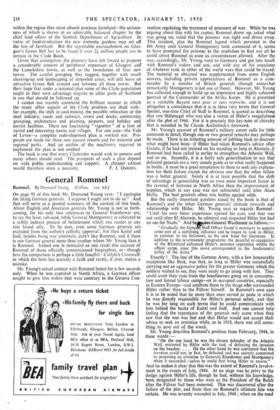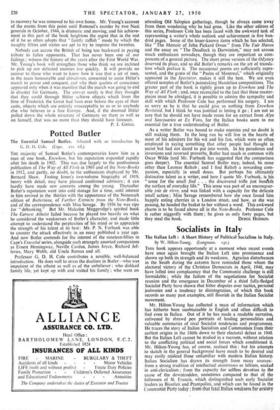General Rommel
Rommel. By Desmond Young. (Collins. 'is. 6d.) • ON page 93 of this book Mr. Desmond Young says: I apologise for liking German generals. I suppose I ought not to do so." And that will serve as a general summary of the content of this book. About English and American generals Mr. Young is not so forth- coming, for his only two references to General Eisenhower are, to say the least, sub-acid, while General Montgomery is subjected to a subtly indirect process of belittlement which one reader at any rate found silly. To be sure, even some German generals are excluded from the author's catholic approval: but then Keitel and Jodl, besides being war criminals, didn't like Rommel, and if there is one German general more than another whom Mr. Young likes it is Rommel. Indeed one is reminded as one reads this account of Rommel of those officially commissioned biographies, or—though here the comparison is perhaps a little fanciful—Carlyle's Cromwell. in which the hero has scarcely a fault and rarely, if ever, makes a mistake.
Mr. Young's actual contact with Rommel lasted for a few seconds only. When he was captured in North Africa, a German officer sought to give him orders that were contrary to the Geneva Con- vention regulating the treatment of prisoners of war. While he was arguing about this with his captor, Rommel drove up, asked what was going on, ruled that the prisoner was right and drove away. This incident, plus the Rommel legend which persisted in the 8th Army until General Montgomery took command of it, seems to have prompted the prisoner to the resolution to find out all he could about Rommel as soon as circumstances allowed. After the war, accordingly, Mr. Young went to Germany and got into touch with Rommel's widow and son, and with any of his associates of whatever rank in either of the world wars that could be traced: The material so obtained was supplemented from some English sources, including private appreciations of Rommel as a com- mander by a number of British generals (though somewhat remarkably Montgomery is not one of these). However, Mr. Young has collected enough to build up an impressive and highly coloured portrait of the Commander of the Afrika Korps. He is presented as a veritable Bayard sans peur et sans reproche, and it is not altogether a coincidence that it is in these very terms that General Speidel, one-time Chief of Staff to Rommel, is quoted as describing that von Sttilpnagel who was also a victim of Hitler's vengefulness after the plot of 1944. For it is precisely this key-note of chivalry that is sounded in Sir Claude Auchinleck's foreword.
Mr. Young's account of Rommel's military career- calls for little comment in detail, though one or two general remarks may perhaps be made. There is an irritating amount of jobbing back to discover what might have been—if Hitler had taken Rommel's advice after Gazala, if he had not insisted on his standing so long at Alamein, if Rommel had been called in earlier to strengthen the Atlantic Wall, and so on. Secondly, it is a fairly safe generalisation to say that defeated generals are a very unsafe guide as to what really happened in battle ; it must be a great temptation to them to seek any explana- tion for their failure except the obvious one that the other fellow was a better general. Surely it is at least possible that the shift of advantage in generalship was an even more important factor in the reversal of fortunes in North Africa than the improvement of supplies, which in any case was not substantial until after Alam Haifa. The best generals often win battles against odds.
But the really important question raised by the book is that of Rommel's and the other German generals' attitude towards and relationship with Hitler. Mr. Young says as regards Rommel: "Until his own bitter experience opened his eyes, and that was not until after El Alamein, he admired and respected Hitler but had no use for Nazis." And btsu4GeneraLWarjimoflt as 'follows:— " Gradually the Gen Staff Officer found it necessary to acquire some sort of a stabilising influence and he began to look to Hitler, in contrast to his followers, as the new hope for Germany. In addition to the re-armament programme, the peaceful re-occupation of the Rhineland enhanced Hitler's personal reputation within the officer corps, since this move .corresponded to the fundamental policy of the Army."
Exactly The line of the German Army, with a few honourable exceptions like Beck, was that, so long as Hitler was successfully carrying out an aggressive policy for the greater Germany which the soldiers wished to see, they were ready to go along with him. They could avert their eyes from the beastlinesses going on in concentra- tion and forced labour camps—or in occupied countries, especially in Eastern Europe—and attribute them to the thugs who surrounded Hitler rather than to the Ftihrer himself. In Rommel's own case it is to be noted that he more than once served in posts in .which he was directly responsible for Hitler's personal safety, and that he was for long on such terms that he could communicate with him behind the backs of Keitel and Jodl. And one cannot help feeling that the repentance of the generals only came when they saw that the war was lbst and that Hitler would not accept their advice to seek an armistice while, as in 1918, there was still some- thing to save out of the wreck.
Mr. Young describes Rommel's position from February, 1944, in these words:— "On the one hand he was the chosen defender of the Atlantic
Wall, entrusted by Hitler with the task of defeating the invasion on the beaches. .. . On the other hand he was convinced that the invasion could not, in fact, be defeated and was secretly committed to proposing an armistice to Generals Eisenhower and Montgomery when it succeeded---unless he could first bring Hitler to reason."
And he makes it clear that this was the extent of Rommel's involve- ment in the events of July, 1944. At no stage was he privy to the design against Hitler's life, though he had, without his knowledge, been designated by those who were as the President of the Reich after the Fithrer had been removed. This Was discovered after the failure of the plot, and from then on Rommel's ultimate fate was certain. He was severely wounded in July, 1944; when on the road to recovery he was removed to his own home. Mr. Young's account of the events from this point until Rommel's murder by two Nazi generals in October, 1944, is dramatic and moving, and his achieve- ment in this part of the book heightens the regret that in the rest of it he so often adopts that "faintly raffish" mode by which the naughty fifties and sixties are apt to try to impress the twenties.
Nobody can accuse the British of being too backward in paying tribute to fallen opponents. That has never been one of our failings ; witness the history of the years after the First World War. Mr. Young's book will strengthen those who think we are inclined to pick up our defeated enemies too quickly. It will provide no answer to those who want to know how it was that a set of men, in the main honourable and chivalrous, consented to assist Hitler's march to power and conquest, and why their qualms of conscience appeared only when it was manifest that the march was going to end in disaster for Germany. The answer surely is that they thought that they could through Hitler achieve objects which from the time of Frederick the Great had been ever before the eyes of their caste, objects which are entirely unacceptable to us or to anybody else who believes in a free Europe. And, if the doomed Hitler pulled down the whole structure of Germany on them as well as on himself, that was no more than they should have foreseen.
P. J. GRIGG.











































 Previous page
Previous page